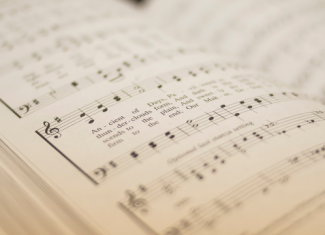November 2022
Young Leaders in Ministry
Love in Humble Service
Music touches our souls and inspires us in ways that no other mode of communication can. At our lowest points, it lifts us. In our rejoicing and celebration, it animates us. When the world seems silent, it speaks to us. In our anger, anxiety and sadness, it soothes us. The playful rhythm of conversation, ornate melodies of bird songs and diminished triad of a passing train’s horn all contribute to our shared human experience. Even for those who cannot hear, music finds a way. Music is, in fact, an unavoidable grace that we receive each day. As an integral part of our worship as Episcopalians, music draws us into prayer, placing the comforting, demanding and sometimes alarming words of scripture onto our lips and into our hearts through a treasury of hymns sung through the generations.
As Episcopalians, we share an extraordinary repertoire of choral music that offers rest, haven, and healing for many musicians in our parishes. The choir room becomes a shelter and community of singers, a second family. Creating music as community unites us in ways that no team or organization ever will. We share a common goal and must realize it together with the utmost accuracy, patience and cooperation. The pilgrimage, from the beginning of a piece to its end, humbles us to learn that nothing in our mortal life happens immediately. Through the successful completion of an artistically sung chorus, we have only just begun our journey of understanding musicality, text, and most importantly, each other.
COVID’s impact on choral and congregational singing
In March of 2020, the Coronavirus pandemic forced us into our homes, and our churches, once lively places of worship, song and celebration, grew dormant. Concert dress rehearsals and Easter preparations were well underway when in only a few days, all who craved sung communion found deprivation and the uncertainty that reshaped our world, heightening fear, depression and loneliness. The centering experience that group singing offered was considered high-risk and lethal.
Some questioned whether this was the end of choral singing altogether, and perhaps even humanity as we knew it. Amid the chaos, music found a way. Church, university and community choirs quickly learned to assemble virtual video choirs, Zoom cocktail hours and even safely-distanced, outdoor gatherings and drive-by events. These were no substitute for ensemble singing and in-person gatherings, but they offered some sense of human connection and relief from the troubling uncertainty that engulfed us.
At Grace Episcopal Church in Holland, Michigan, where I serve as Music Director, we too found a way to retain a sense of community by streaming the Sunday Eucharist. Though crude in quality, many congregants found the sounds of the pipe organ, peaceable timbre of the rector’s voice and familiar view of the pulpit and altar space comforting. Though we could not gather in person, worshippers participated by commenting on the live feed, responding to the dialogues of the mass, offering universal prayers and even passing the peace. As the organist played the hymns, those with copies of The Hymnal 1982 at home sang along. We offered drive-thru communion in the parking lot, so that we could continue sharing in the Body of Christ. While the live video worship experience quenched the thirst for liturgy and some sense of church community, our need for sung communion remained unfulfilled.
Struggle and joy for singers and worshippers alike
On Christmas Eve 2020, the faithful of Grace gathered outdoors on a beautiful, snowy evening to celebrate the birth of Christ. The hymns, played by the organist from inside the church were streamed for those gathered, uniting them in congregational song after nearly nine months. The beauty of the evening and blending of voices wove a powerful, comforting sense of normalcy, briefly blanketing our distorted reality. Our pilgrimage through the pandemic was far from over, but our ability to rest, sing and feast at Christ's table offered healing and the strength to carry on.
In June of 2021, when COVID cases reached an all-time low following the winter months, we were once again able to gather as church indoors. Seeing the faces and hearing the voices of those we had not encountered in person for over a year brought newfound joy and childlike giddiness into our church, another moment of rest for weary travelers. Once again, congregational song found its place in our lives. In-person worship continued through summer and into autumn, bringing back the comfort of the Sunday routine.
Finally, in October of 2021, the Grace Chamber Choir resumed rehearsals after a two-year hiatus. We implemented COVID-mitigation strategies such as masking, distancing and a powerful air purifier to ensure the health and safety of all choristers. After such a significant break, it took some time to relearn the courtesies of choral singing (especially with masks), blending and group interaction, and required patience, understanding hearts and prayer.
As we approached Christmas in 2021, Grace Choir had regained most of what was lost over the course of two years and presented beautiful, stirring music for the service of Lessons and Carols on the fourth Sunday of Advent. Unfortunately, with COVID cases rising sharply, even among choristers, the choir once again had to pause, just days before Christmas Eve. This pause continued until Ash Wednesday, when we were once again able to sing as ensemble.
Later in March, COVID cases had decreased to the point where masks could be removed, bringing an even greater sense of normalcy into our choir space. As we celebrated the Paschal Triduum and Easter Sunday, the peace of the Risen Christ and joy of our resurrected choir filled Grace Church with a sense of excitement that I will remember for the rest of my life. Music indeed found a way.
Stephen Rumler moved to West Michigan after graduating from Aquinas College in the class of 2020. He was delighted to join Grace Episcopal Church as Music Director in the Fall of 2021. In addition to singing, playing piano and organ, Stephen enjoys cooking, staying active and spending time with friends and family.
Resources:
- Singing Our Song by Anna Olson, an ECF Vital Practices blog, April 8, 2016
- The Creed: Profession of Faith, Love Song and Prayer by Lisa G. Fischbeck, an ECF Vital Practices blog, August 6, 2019
- Music for Team Building by Sandra T. Montes, Vestry Papers, January 2019
- Music and Change: A Conversation with Dent Davidson, by Sandra T. Montes, Vestry Papers, July 2021






